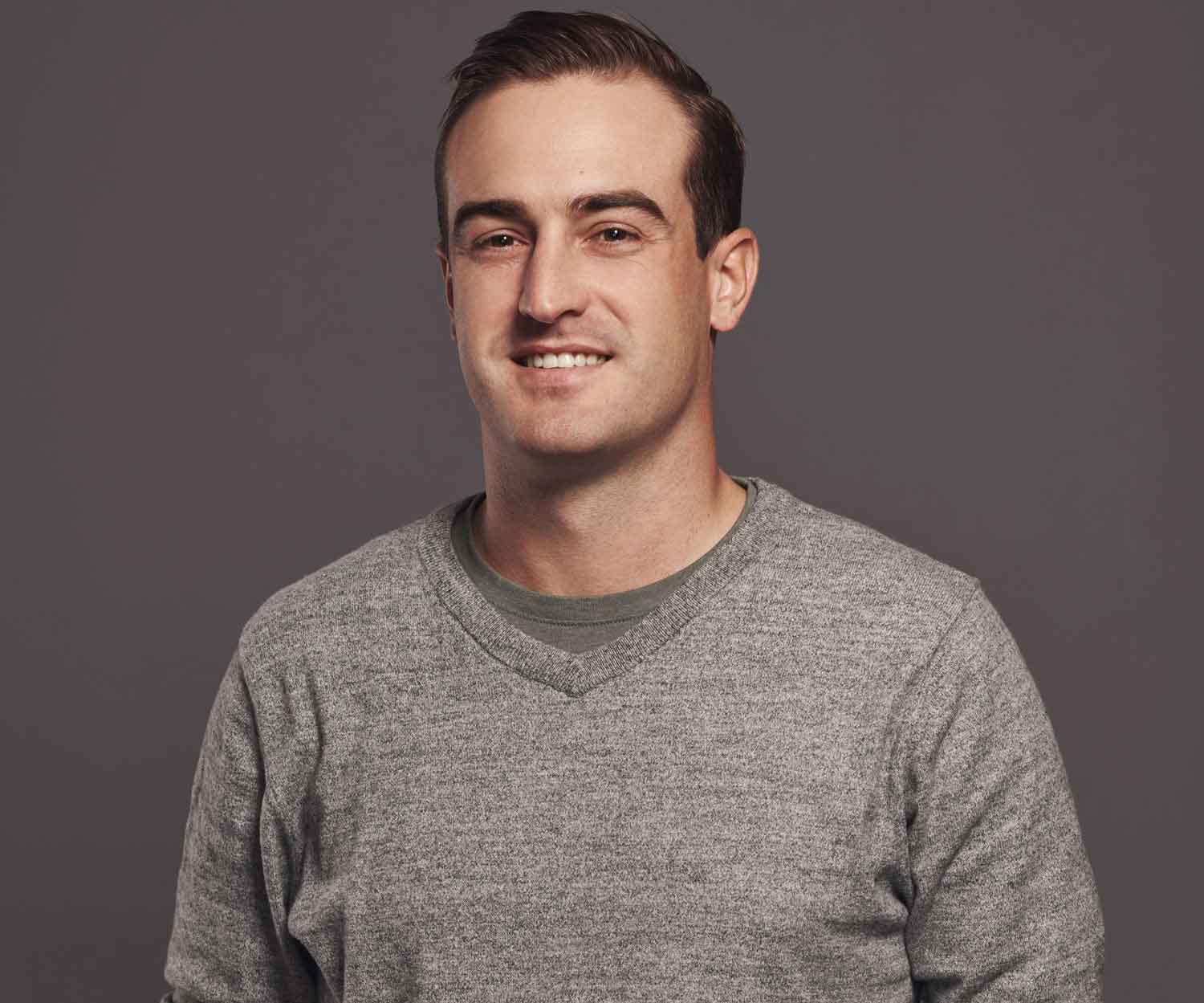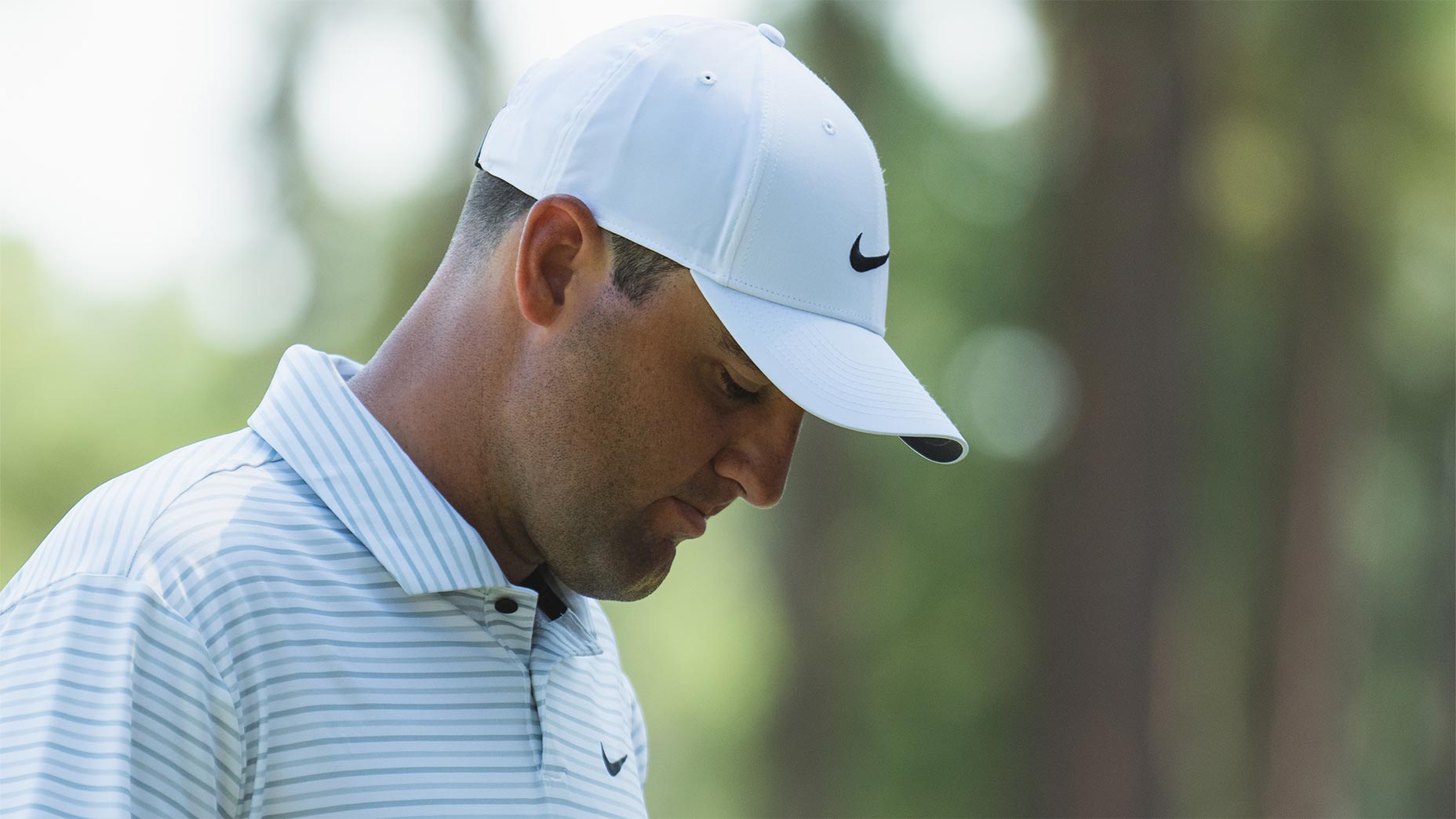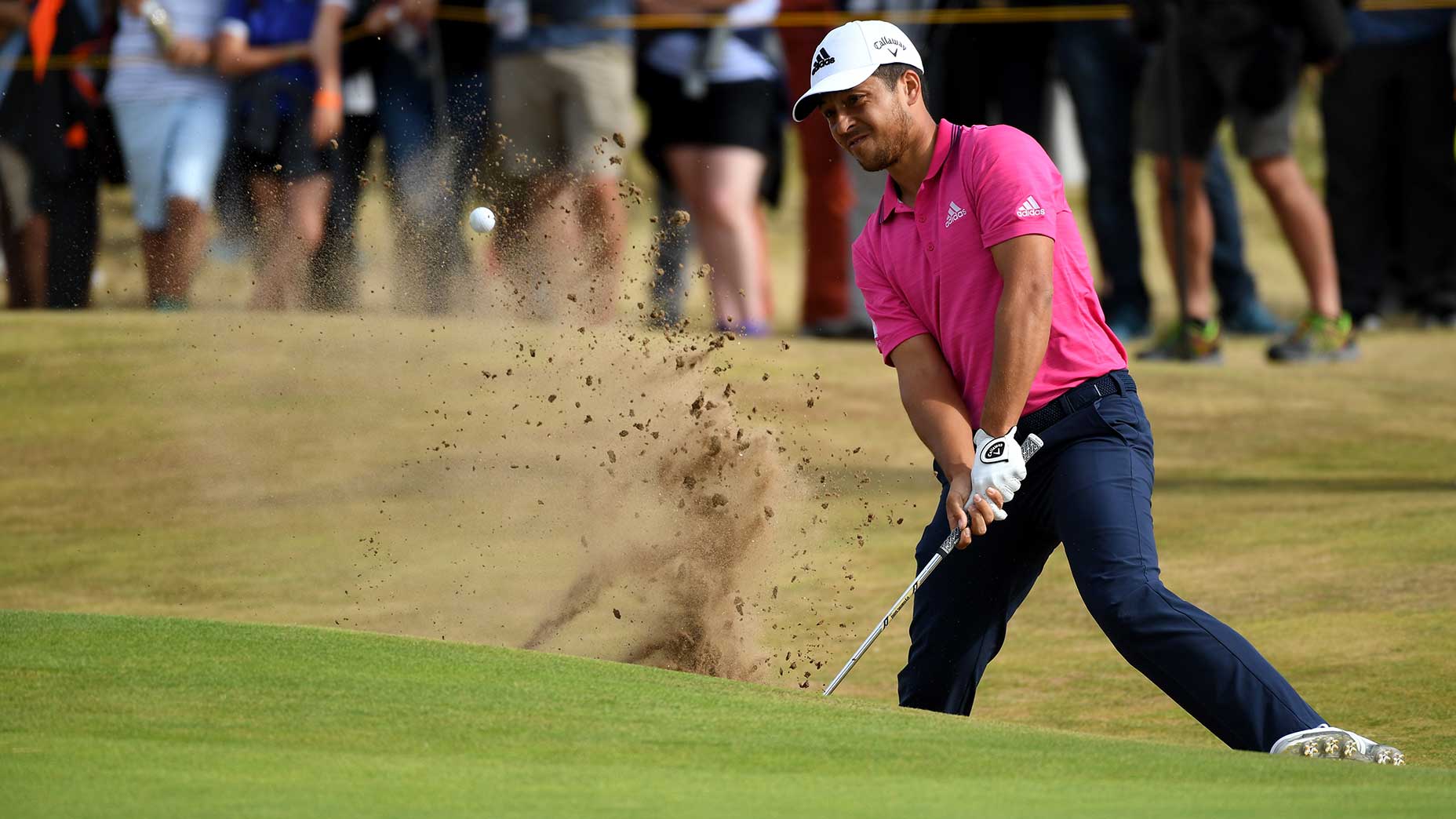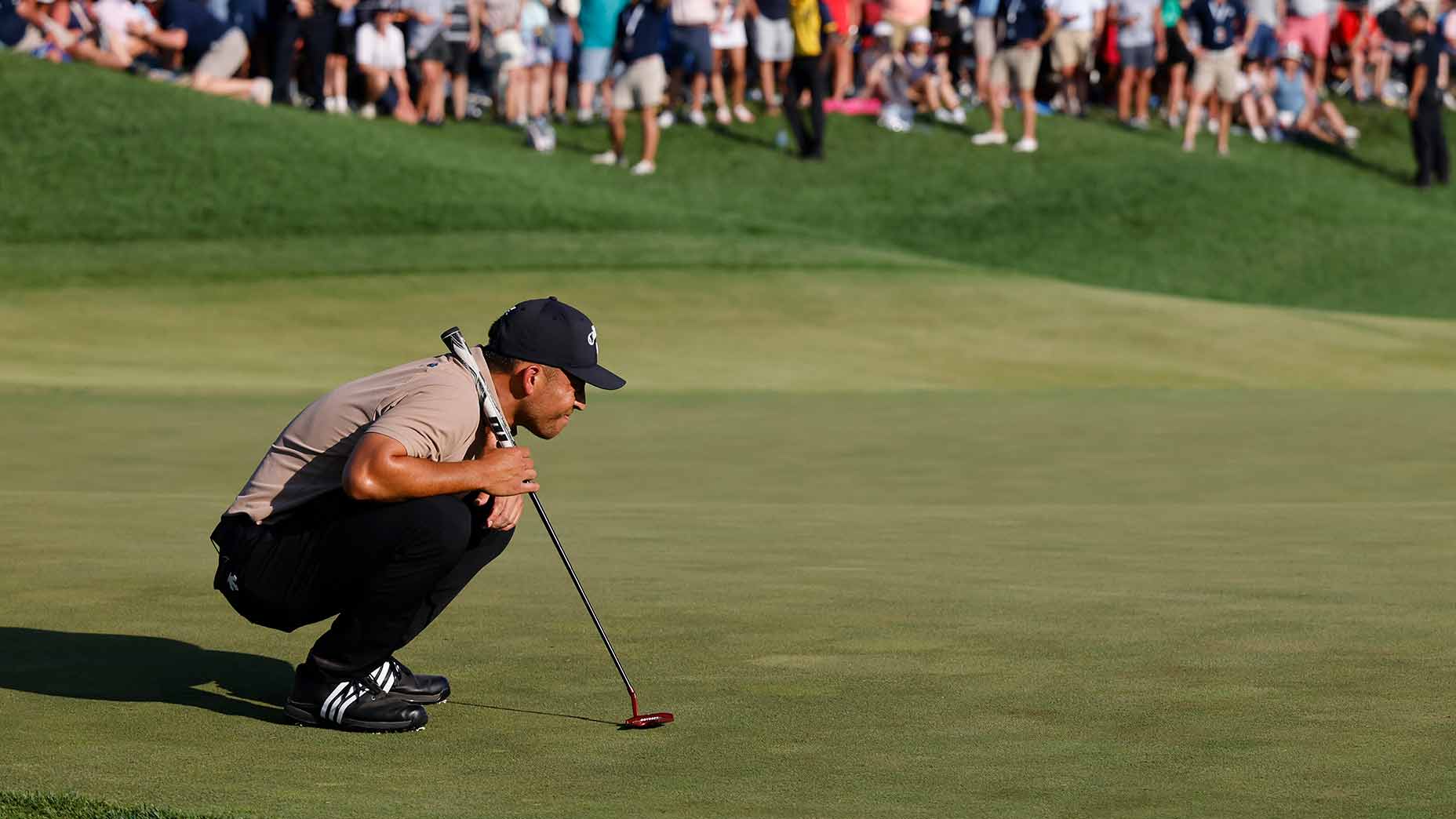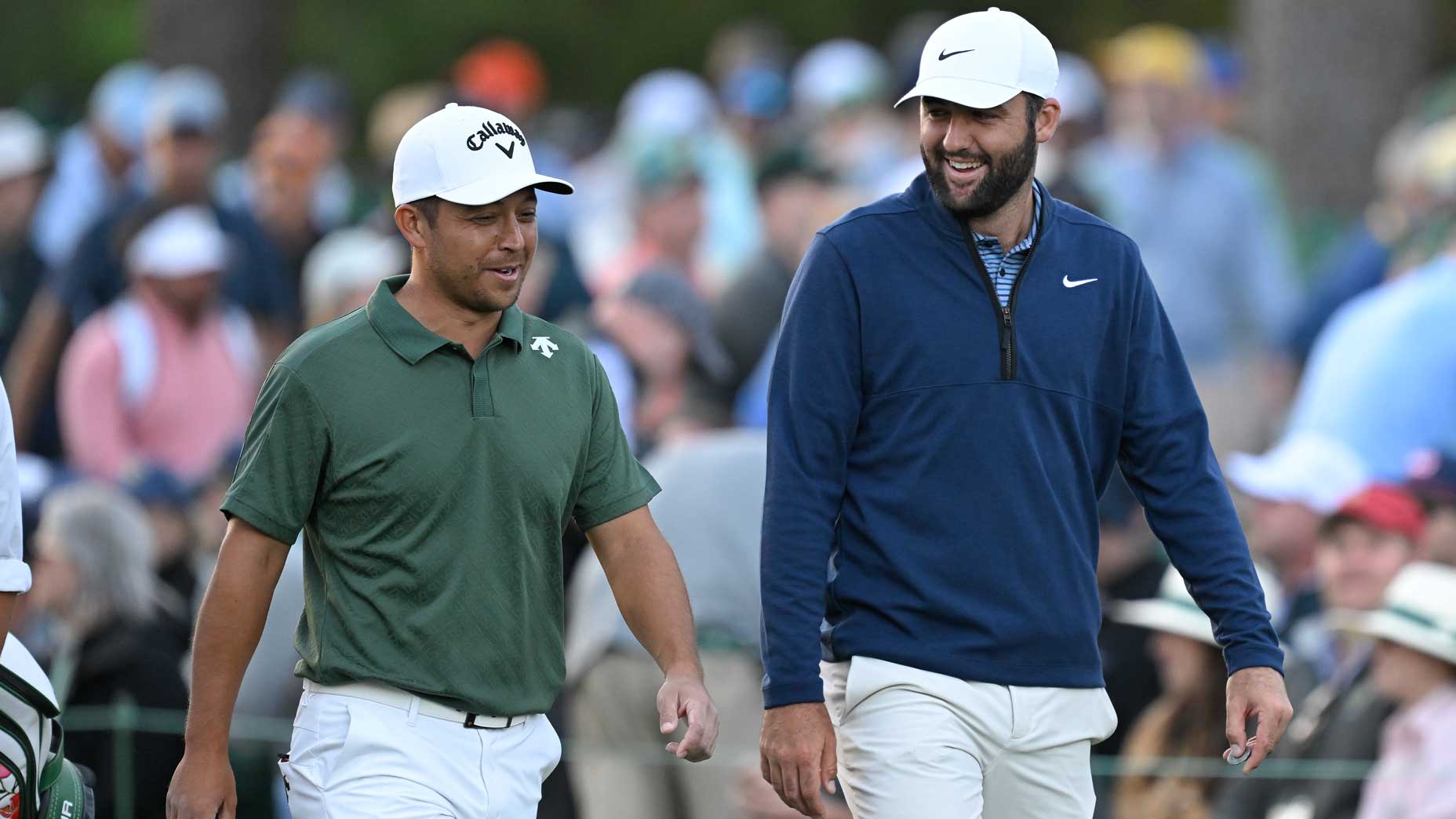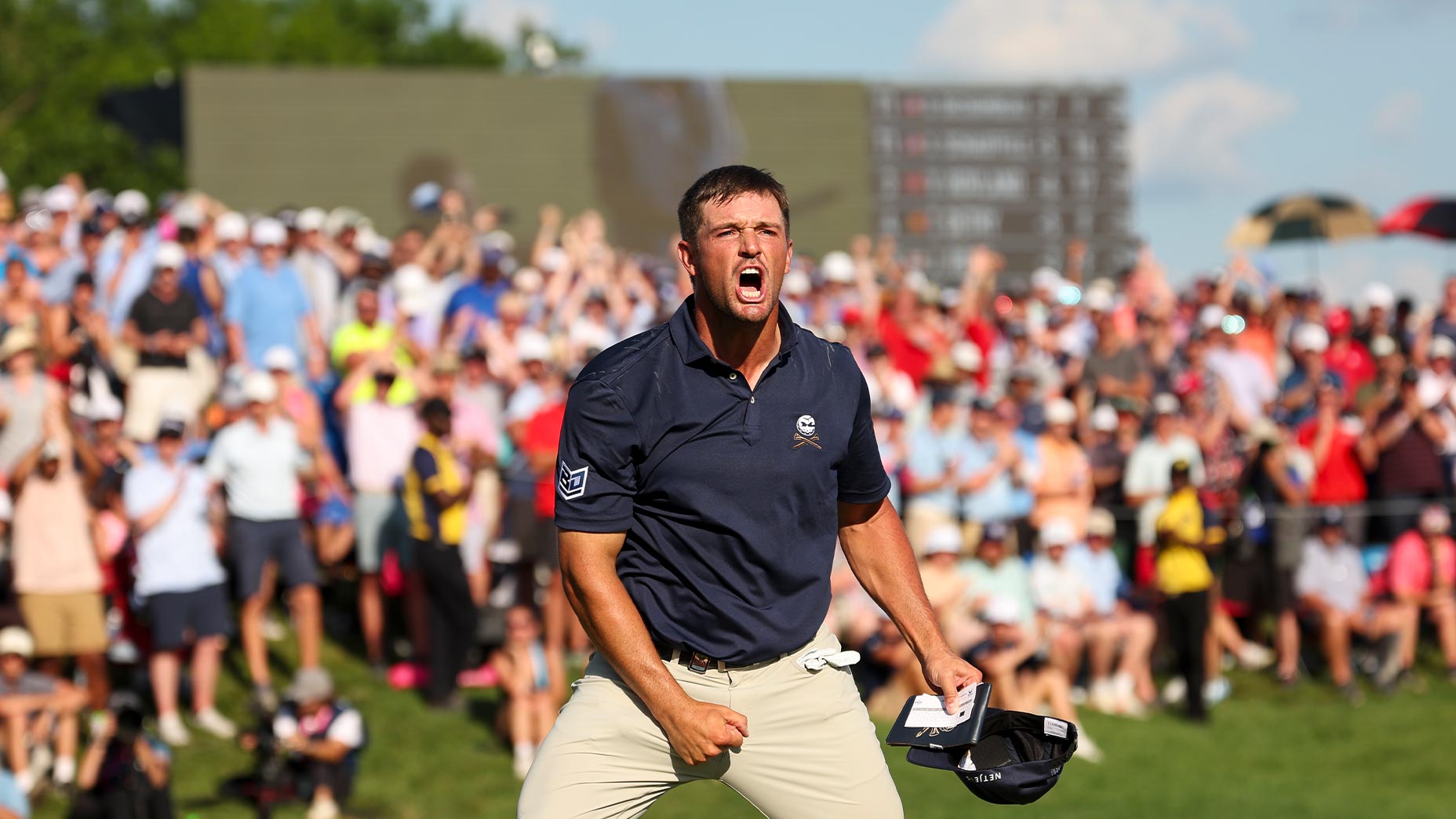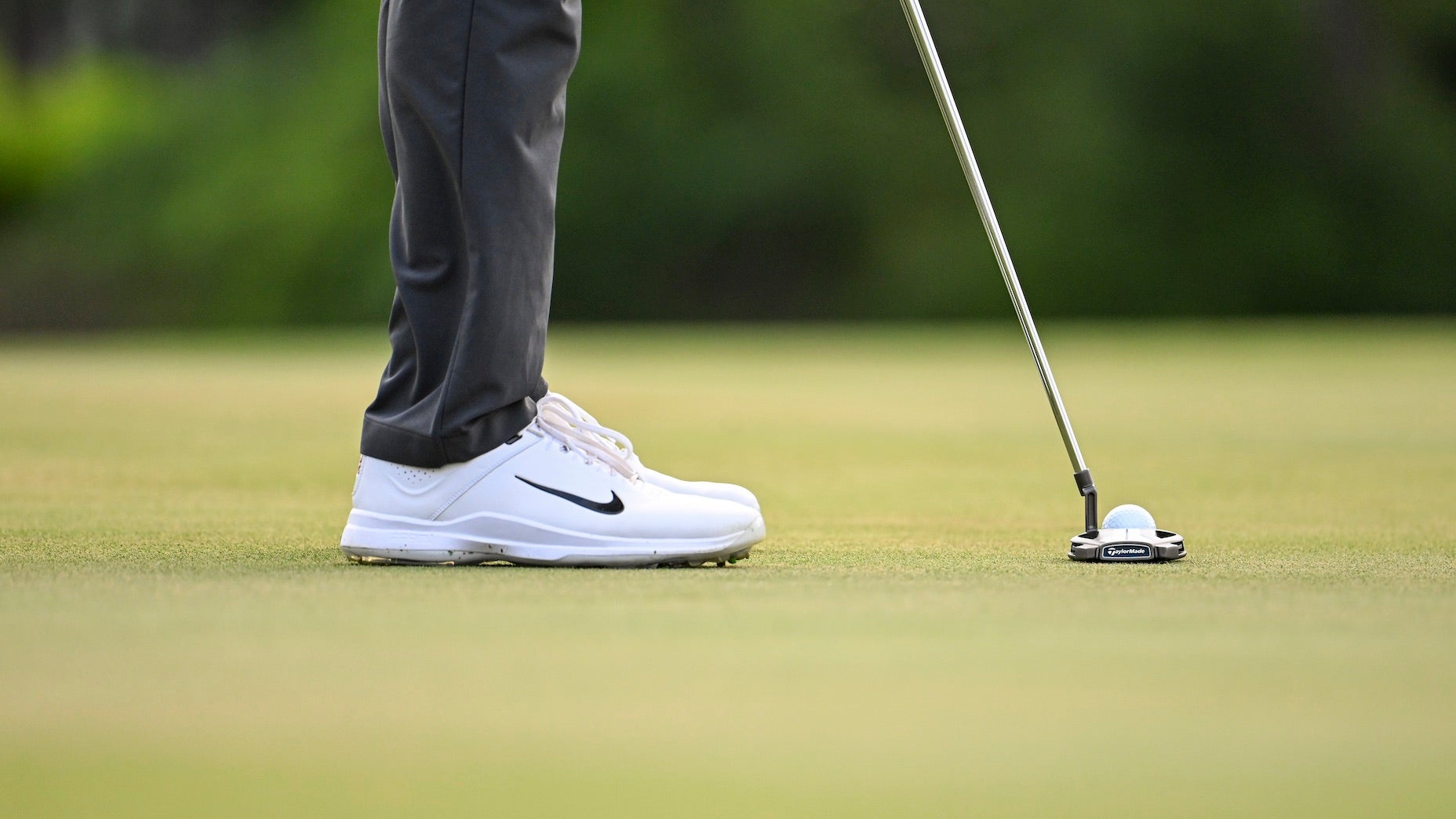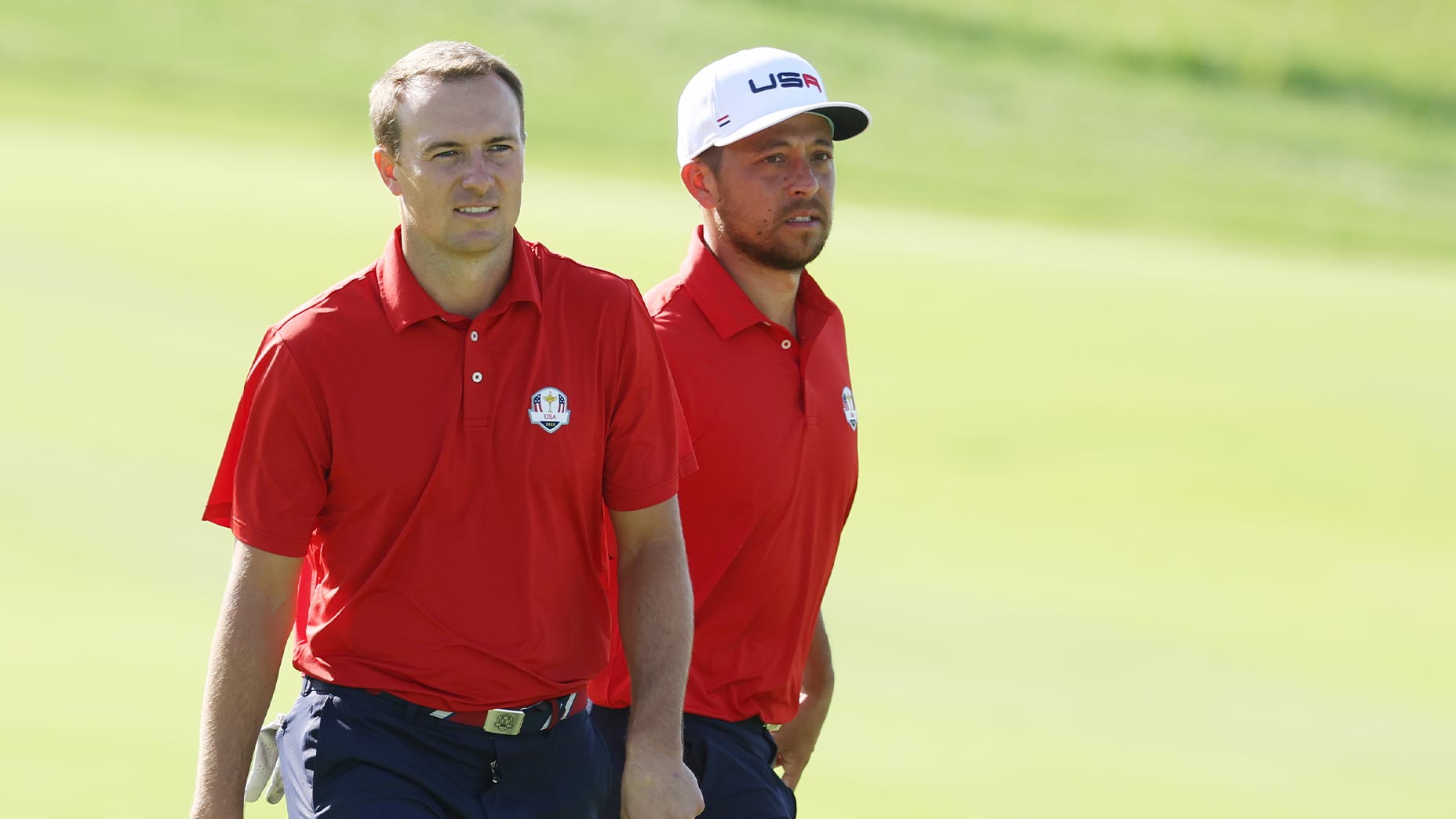Xander Schauffele’s breakthrough win? A 5-word text explains it all
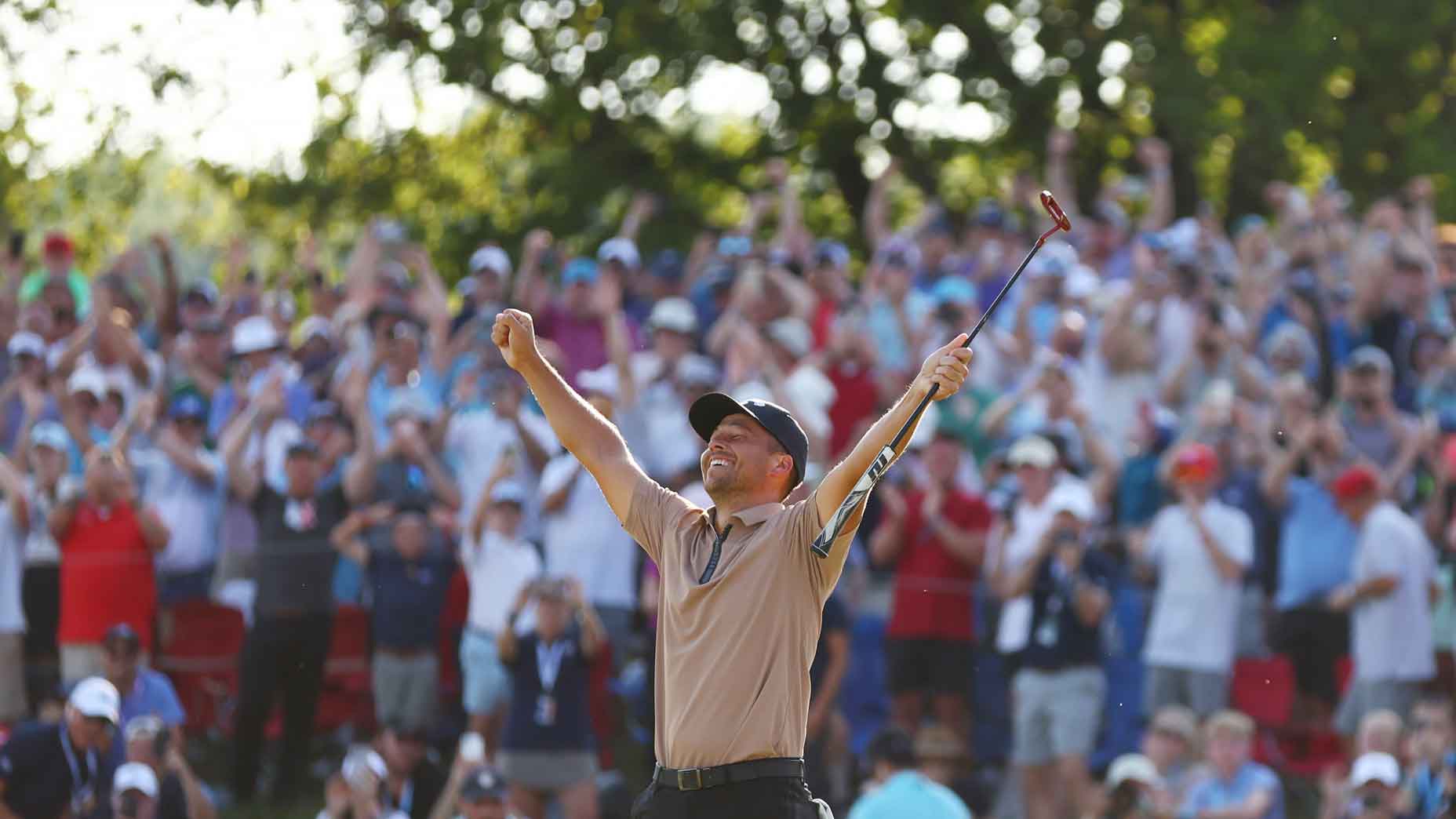
Xander Schauffele lifts his hands in victory at the PGA Championship Sunday at Valhalla Golf Club.
Adam Chistensen
LOUISVILLE, Ky. — On Saturday night, before yet another final pairing of yet another final round for yet another opportunity for an undeniable, I’m-as-good-as-everyone-says-I-am victory, Xander Schauffele’s father sent him a text.
“Steter tropfen höhlt den stein,” was the message, in Stefan Schauffele’s native German, umlaut and everything, no punctuation required. Xander asked for a translation.
Chris Como, the world-famous coach who has been working with Xander for six months, allowing Stefan to — in Xander’s words — “take his hands off the wheel,” received the same message from Stefan, who was chiming in from Hawaii.
Steter tropfen höhlt den stein. A constant drip wears away the stone.
To talk with Xander’s old man — affectionately known as The Ogre, for his imposing size and boisterousness — is to hear phrases like that one. He was a reader growing up, his son says, and is a walking list of sayings. This phrase, though — a greek proverb that dates back to the 5th century — is the most fitting Stefan-ism as it embodies the current moment in Xander’s life, as he plays the very best golf he’s ever played.
That constant drip is great, they think, so long as it breaks that damn stone.
IF SCOTTIE SCHEFFLER IS THE CURRENT STANDARD for brilliant golf, then Xander Schauffele is the current standard for steady golf. He hasn’t missed a cut in two years. Eight top 10s this season alone. (Nine, now.) The leading golf analytics site, DataGolf, even ranks tournament fields by a metric of X-Score, named in his honor — the likelihood that a perennial top-5 player like X (Xander) would win.
Steadiness is good, and his version of steady is great. It pays the bills and puts you on Ryder Cup teams and even earns you equity in the PGA Tour, but it doesn’t guarantee you any trophies. He’s been winless for 22 months, a fact he volunteered out loud all week. He has finished in the top 20 of the last eight major championships, but never inside the top 5. Often the bridesmaid, never the bride, questioning if that stone is ever gonna break, just like a lot of other great pros.
“I always say this about people who haven’t won a Tour event before, or just a major professional event,” Max Homa said this week. “You could have all the people in the world tell you It’s possible and You can or whatever, but it kind of almost takes you doing it once to truly be able to confirm that to your own mind.”
Schauffele admitted as much to himself. After turning 30 and completing seven damn-good years on the PGA Tour, he had become the undisputed Best Player Without a Major. The BPWAM is a backhanded compliment the golfing world hands out to different players at different times, only when they’ve earned it — the good part and the bad.
“I thought I was [that],” Schauffele said Sunday night. “Not that people saying it made me think that. I just felt like I’ve done enough work, I’m good enough to do it. I just needed to shut my mind up and actually do it.”
But doing it in this sport is unlike any other. To do it in this arena is to conquer body and mind and beat 155 others all at once. To do it in this sport is to stretch brilliance across 72 holes and four days, with everyone demanding you look ahead to the finish line. “There’s nothing else to do but keep doing what you’re doing,” Como said five days ago, from the Valhalla locker room. He was putting himself in Xander’s head, rationalizing what the next step was after Rory McIlroy drubbed Schauffele on Sunday at the Wells Fargo Championship.
“What are you gonna do?” Como asked rhetorically. It was a 99th percentile day — a final-round 65 — from a 99th percentile player. Don’t get bothered by variance.
He didn’t. Even his own. Two days later, when Schauffele shot a record-tying 62, he told the press: “It’s just Thursday,” with a “slow your roll” grin.
On Friday afternoon, his message was: “It’s just 36 holes. It’s a really good start to a tournament.”
On Saturday night, no change: Tomorrow is “just another Sunday.”
Keep plugging away, let the water drip, and don’t say a thing about it. That’s his modus operandi. You’re more likely to receive a knowing smile from Schauffele than a thoughtful sentiment. He keeps things in. Rather than share what he’s thinking with the world, Xander types ideas into the notes app on his phone. Things his wife doesn’t see. Things his caddie is curious about. He aims for a lot of positive self-talk. Commit, execute, and accept is a phrase that he thinks of constantly. Another Stefan-ism.
THERE’S A THIRD TELLING PHRASE that kicks around in Schauffele’s head, which he shared earlier this year, after a near-miss at the Players Championship, in March.
“I tell myself all the time,” he said, “if you’re trying to win you’ve got to walk through the fire. And if you’re able to walk through unscathed, then you’re going to win the tournament.”
At Valhalla, fire-breathers were two groups ahead. Viktor Hovland and Bryson DeChambeau, two of the best in the world, traded birdies and pulled the crowd in their direction. Hovland punched first, making birdies at 5, 6 and 7 and another trio at 10, 12 and 13. DeChambeau found his birdies more liberally, splayed out across his round, never dropping a shot. Schauffele fended off both with two of the prettiest irons of his week — a 210-yard dart into 11 (birdie) followed by a 205-yard soft fade into 12 (birdie). He reached 20 under on the walk to 13, but his goal all day was 22. “Someone was going to shoot seven under,” said his caddie, Austin Kaiser. He was right.
Hovland had a 10-footer on 18 for exactly that, 64, but it slid by. DeChambeau also had a 10-footer on the 18 for 64, and unlike Hovland he made it, sending echoes of uncertainty through the groups behind. Golf fans speak with their cheers first, but also their feet, and the majority of spectators at Valhalla were with that third-to-last group, following the game’s greatest entertainer. Schauffele’s walk through the fire grew hotter as he neared the final hole, because DeChambeau had pulled everyone to 18 and now they’d stuck around to see what might happen.
After a scrambling par on 17, Schauffele needed 5 for a playoff and a 4 to win outright. He had been staring down leaderboards all day — a habit he doesn’t typically employ, but exactly the kind of change you might implement as the BPWAM. When his final tee ball trickled into the first cut, a ring of soft turf around the fairway bunker, he chuckled. “I was like, if you want to be a major champion, this is the kind of stuff you have to deal with.”
Xander dug his toes into the sand and swung at the teed-up Callaway like a baseball player, catching it clean and drawing, just short left of the green.
For a player who considers the short game one of his “trigger stats” — as in, when he’s lost, that’s been the reason — it was a scary place to chip from. He’d be working up the same hill that killed Rory McIlroy’s bunker shot in 2014. But Xander liked where he’d ended up, and for a player so good that data scientists fawn over his skillset, sometimes liking it all that matters. We know he liked it because his caddie, Austin Kaiser, was still gawking at the shot an hour later, victory drink in hand.
MAJOR CHAMPIONSHIPS ARE LONG, drawn-out, pressure cookers that get decided in an instant and fizzle out in one dizzying, emotional blur. Xander got up and down for that 4 and promptly threw both hands into the sky, creating a visual the doubters can think about forever. Kaiser raced in for a hug, telling his friend he loved him. Como was immediately brought to tears. “I’m feeling emotional man!” he said, walking in Xander’s wake to the scoring tent. “I’m usually stoic in golf. But f—k.“ His wife was crying, his uncle was tearing up. Schauffele called his father, who was bawling into the phone. Xander had to pull away, or else he’d start bawling too.
When the fruits of your labor are left out of your control, nerves do weird things. Como was panting in the aftermath, his breath short. To take his mind off the action, Como actually left the grounds of Valhalla, mid-round, and gave a local friend’s son a swing lesson Sunday afternoon.
But around 7:30 p.m. as this wacky PGA came to a close, Kaiser had that victory drink in hand and stood with Como down the 18th fairway as Xander took photos with the grounds crew, the volunteers, the turf staff, PGA executives and toasted champagne with the Valhalla membership.
Como and Kaiser were golf junkies aglow, unsure what to do with themselves as the sun-kissed hole laid out in front of them. They gave interview after interview, took photo after photo, and then began diving into the play-by-play, jogging up to the spot where Schauffele’s up-and-down began. Kaiser spotted the mark where Schauffele’s wedge clipped the grass and began replaying the moment. Como whipped out his phone and began narrating a video. “This is the chip,” he said, giddy as a child.
“When he got here,” Kaiser said, “he went up and he goes, ‘If you would have told me I was gonna hit it here, I would have taken it.’”
“That’s awesome. What an attitude,” Como said. His eyes wide, curious and impressed. What more was there? The goals Xander and Austin shared on the course, how Austin advised him on his putting throughout the round, the statistics he cited to plot their way from one advantage to another. Drip, drip, drip.
“He got here and I was like S—t. Hell yeah. He likes this shot.”
As the breakdown continued, Xander cruised off behind the green in a golf cart. The destination: Stop no. 9, 10 or 11 on the victory tour. He had the Wanamaker Trophy in hand and a stone cracked in his mind.

